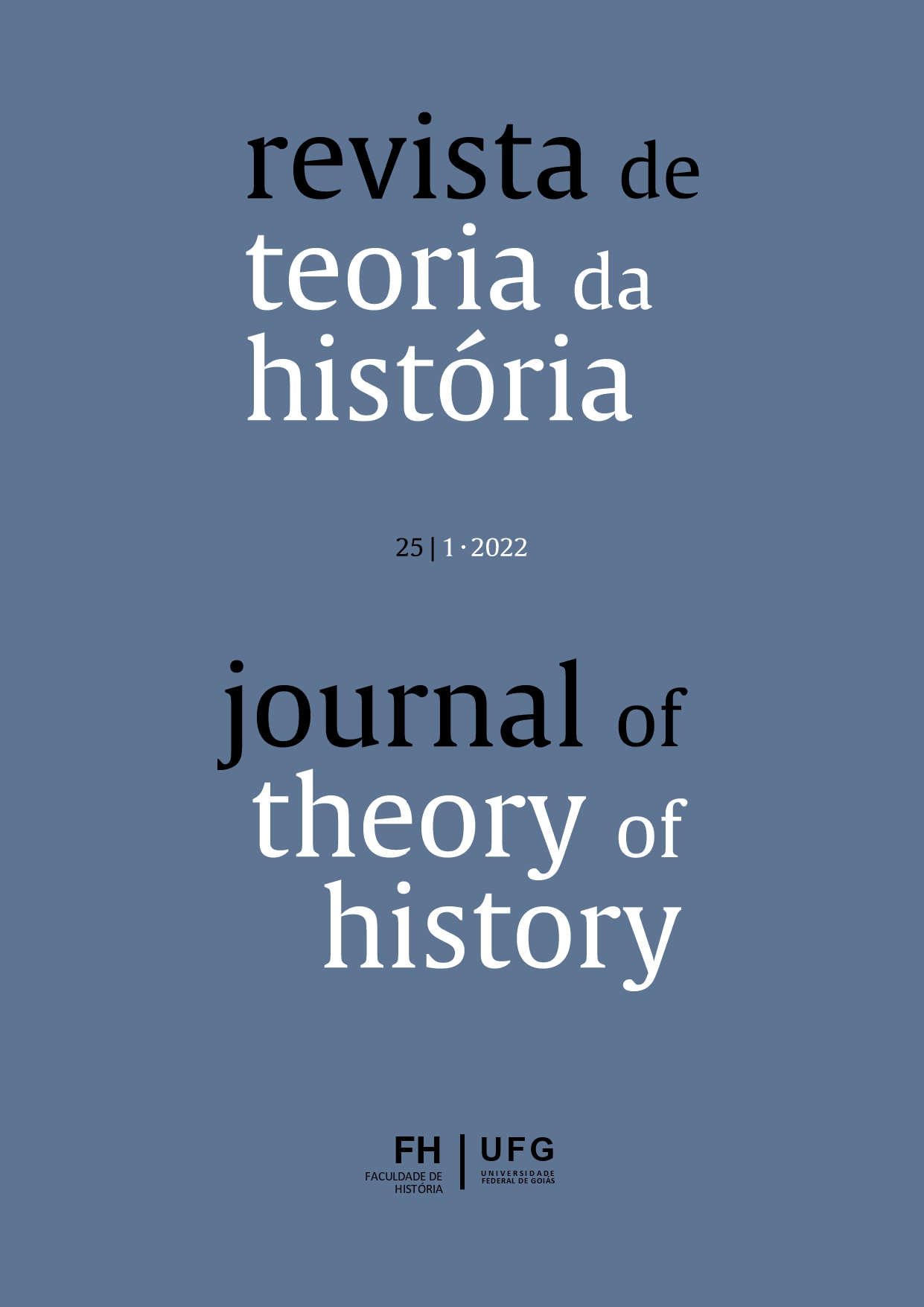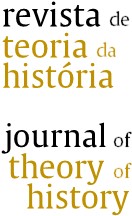The hermeneutic problem posed by digital humanities
DOI:
https://doi.org/10.5216/rth.v25i1.70880Palavras-chave:
Hermenêutica, história, humanidades digitaisResumo
This article aims to present the hermeneutic problem related to the emergence of the research field widely known as digital humanities. In general, at the epistemological level, this problem involves the consideration of a theory of historical interpretation that articulates research methods and techniques with digital objects in their symbolic character. At the ontological level, it highlights the need to take into account the constitutive aspects that make this theory of interpretation possible. By examining the historical-philosophical foundation of the hermeneutic paradigm, as well as the engagement of human sciences at large — and history in particular — with digital technologies, we have come to the conclusion that a digital historical hermeneutics needs to go beyond epistemological and methodological reflections towards the questioning of the ontological conditions not only of human understanding but also of machine interpretation.
Referências
BERRY, David (ed.). Understanding Digital Humanities. London: Palgrave Macmillan, 2012.
CAPURRO, Rafael. Digital hermeneutics: an outline. AI & Society. Volume 25, Issue 1, 2010.
DILTHEY, Wilhelm. Der Aufbau der geschichtlichen Welt in den Geisteswissenschaften. Gesammelte Schriften Band 7. Stuttgart/Göttingen: Teubner Verlagsgesellschaft/ Vandenhoeck & Ruprecht, 1965.
DROYSEN, Johann Gustav. Historik. Band 1: Rekonstruktion der ersten vollständigen Fassung der Vorlesungen (1857). Grundriß der Historik in der ersten handschriftlichen (1857/1858) und in der letzten gedruckten Fassung (1882). Stuttgart: Friedrich Frommann Verlag Günther Holzboog GmbH & Co, 1977.
GADAMER, Hans-Georg. Wahrheit und Methode. Grundzüge einer philosophischen Hermeneutik. Gesammelte Werke Band 1. Tübingen: J. C. B. Mohr (Paul Siebeck), 1999.
GADAMER, Hans-Georg. Wahrheit und Methode. Ergänzungen. Register. Gesammelte Werke Band 2. Tübingen: J. C. B. Mohr (Paul Siebeck), 1993.
GIBBS, Fred; OWENS, Trevor. The Hermeneutics of Data and Historical Writing. In: DOUGHERTY, Jack; NAWROTZKI, Kristen (ed.). Writing History in the Digital Age. Ann Arbor: University of Michigan Press, 2013.
HAYLES, Nancy Katherine. Bodies of Texts, Bodies of Subjects: Metaphoric Networks in New Media. In: RABINOVITZ, Lauren; GEIL, Abraham. Memory Bytes. History, Technology, and Digital Culture. Durham and London. Duke University Press, 2004.
HAYLES, Nancy Katherine. How We Think: Transforming Power and Digital Technologies. In: BERRY, David (ed.). Understanding Digital Humanities. London: Palgrave Macmillan, 2012.
HEIDEGGER, Martin. Ontologie. Hermeneutik der Faktizität. Gesamtausgabe Band 63. Frankfurt am Main: Vittorio Klostermann, 1988.
HEIDEGGER, Martin. Sein und Zeit. Gesamtausgabe Band 63. Frankfurt am Main: Vittorio Klostermann, 1977.
KISIEL, Theodore. The Genesis of Heidegger‘s Being and Time. Berkeley/Los Angeles: University of California Press, 1993.
KRÄMER, Sybille; BREDEKAMP, Horst. Culture, Technology, Cultural Techniques – Moving Beyond Text. Theory, Culture & Society. 30 (6), 2013.
MACLEAN, Michael J. Johann Gustav Droysen and the Development of Historical Hermeneutics. History and Theory, Vol. 21, No. 3, 1982.
MALLERY, John; HURWITZ, Roger; DUFFY, Gavan. Hermeneutics: From Textual Explication to Computer Understanding? A.I. memo no. 871. MIT artificial intelligence laboratory, 1986.
MANNING, Patrick. Big Data in History. London: Palgrave Macmillan, 2013.
MANOVICH, Lev. How to Compare One Million Images? In: BERRY, David (ed.). Understanding Digital Humanities. London: Palgrave Macmillan, 2012.
MANOVICH, Lev. Software Takes Command. New York: Bloomsbury, 2013.
MARCUSE, Herbert. Hegels Ontologie und die Theorie der Geschichtlichkeit. Schriften Band 2. Frankfurt am Main: Suhrkamp, 1989.
MORETTI, Franco. Graphs, Maps, Trees: Abstract Models for a Literary History. New York and London: Verso, 2007.
NICODEMO, Thiago Lima; CARDOSO, Pontes Cardoso. Metahistory for (Ro)bots: Historical Knowledge in the Artificial Intelligence Era. História da Historiografia: International Journal of Theory and History of Historiography, v. 12, n. 29, 2019.
RAMSAY, Stephen. Reading machines: toward an algorithmic criticism. Champaign: University of Illinois Press, 2011.
RICOEUR, Paul. De l‘interprétation. Essai sur Freud. Paris: Le Seuil, 1965.
RICOEUR, Paul. Le conflit des interprétations. Essais d'herméneutique. Paris: Editions du Seuil, 1969.
RICOEUR, Paul. Temps et récit. Tome III. Pais: Éditions du Seuil, 1985.
ROMELE, Alberto; SEVERO, Marta; FURIA, Paolo. Digital hermeneutics: from interpreting with machines to interpretational machines. AI & Society, vol. 35, 2018.
ROMELE, Alberto. Digital Hermeneutics. Philosophical Investigations in New Media and Technologies. New York: Routledge, 2020.
SCHNAPP, Jeffrey; PRESNER, Todd. The Digital Humanities Manifesto 2.0, 2009, p. 2. Disponível em: https://www.humanitiesblast.com/manifesto/Manifesto_V2.pdf.
THEIBAULT, John. Visualizations and Historical Arguments. In: DOUGHERTY, Jack; NAWROTZKI, Kristen (ed.). Writing History in the Digital Age. Ann Arbor: University of Michigan Press, 2013.
VAN ZUNDERT, Joris. Screwmeneutics and Hermenumericals: The Computationality of Hermeneutics. In: SCHREIBMAN, Susan; SIEMENS, Ray; UNSWORTH, John (ed.). A New Companion to Digital Humanities. Hoboken: John Wiley & Sons, 2016.
Downloads
Publicado
Como Citar
Edição
Seção
Licença
Copyright (c) 2022 rth |

Este trabalho está licenciado sob uma licença Creative Commons Attribution-NonCommercial-NoDerivatives 4.0 International License.
A Revista publica única e exclusivamente artigos inéditos. São reservados à Revista todos os direitos de veiculação e publicação dos artigos presentes no periódico.
Licensed under a Creative Commons Attribution-NonCommercial-NoDerivatives 4.0 International License



